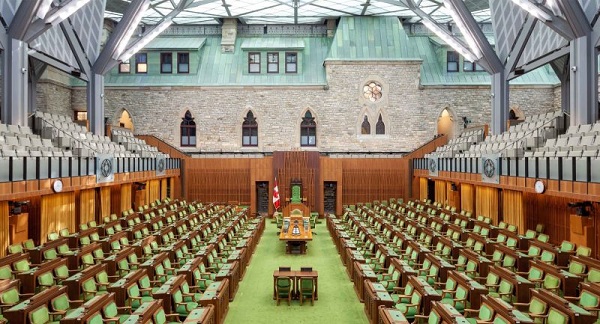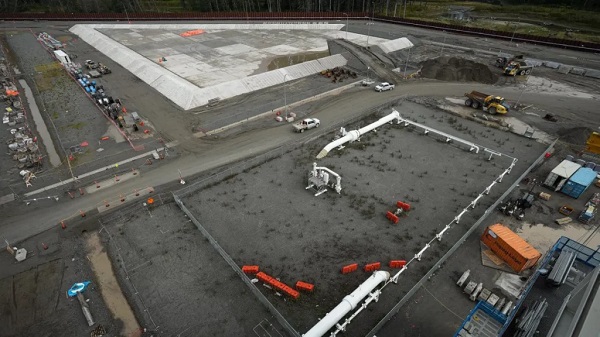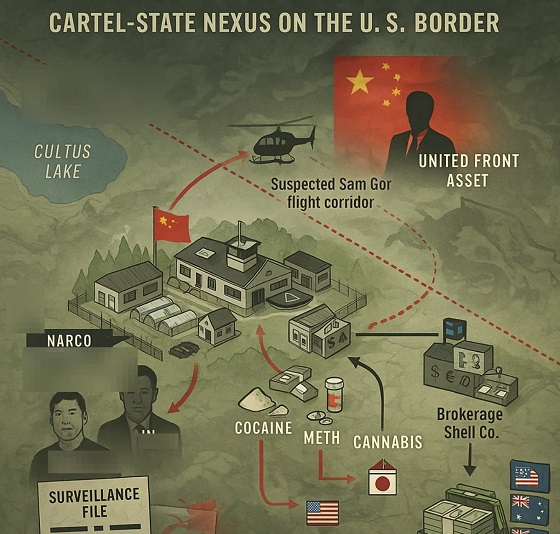Frontier Centre for Public Policy
Canada Fulfills the Dystopian Vision

From the Frontier Centre for Public Policy
By Lee Harding
The country our ancestors built is being torn down. The welfare state runs on massive deficits, increasing our public fiscal slavery. Cancel culture kills free speech. The government funds the Anti-Hate Network to oppose religious conservatives, which negatively stereotypes them.
Poet T.S. Elliot once wrote, “This is the way the world ends. Not with a bang but a whimper.” Canada has fallen but has all the illusion of being what it always was. Many Canadians fail to see a dystopian future foretold decades ago has arrived. Our institutions are failing us.
In Orwellian fashion, The Charter of Rights and Freedoms has transformed Canadian values in the pretense of upholding them. They eliminated federal laws that made Sunday a day of rest, forced the provision of abortion and euthanasia in the name of the security of the person, and banned prayer from city hall meetings in the name of religious freedom.
The pandemic cranked the judges’ distorted amp right up to 11. In B.C., Chief Justice Christopher Hinkson struck down public health orders banning protests, but quizzically maintained the ban on religious assembly. Elsewhere, the hypocrisy just continued, laws or no laws.
Ontario Premier Doug Ford and Prime Minister Justin Trudeau could bow the knee at Black Lives Matter protests that exceeded gathering limits, while those who did so for church services or rallies against mandates were prosecuted–or even persecuted. The Walmarts and Superstores were packed, while the churches and small businesses sat empty.
Doctors who prescribed ivermectin, one of the safest and widely effective drugs of all time, faced medical censure–even if their actions saved lives. Medical colleges became bodies that betray the profession’s values by banning medical opinions and the off-label use of drugs when it contradicts poor policies based on weak evidence.
The media, which should have been pushing back at this nonsense, went along with the charade as if it was the right thing to do. Any perspective that could foment doubt against the recommendations and policies of those in power was banned. Such is the practice of authoritarian countries, which is what Canada became.
As law professor Bruce Pardy has noted, Canada has shifted from the rule of law to the rule by laws. Here, legal systems manage the public and the law and courts fail to call the governments to account. A rally that’s permitted one minute can be trampled by the Emergencies Act the next, while donors to a protest see their bank accounts seized. Did you lose your job for refusing a vaccine? Too bad. Oh, and you don’t get EI either.
The pandemic and its fear subsided, but neither sober reflection nor an adequate reckoning arrived. People kept getting COVID after the vaccinations, yet some are getting booster shots to this day. Analysts such as Denis Rancourt, credit public responses, including vaccines, for worldwide excess mortality of 17 million. Yet, the bombshell falls like a dud, either ignored or diffused by dismissive “fact-checkers.” The life expectancy of Canadians dropped two full years and barely a shoulder was shrugged.
Even our elections fail to inspire confidence. In many municipalities, programmable computers count the votes and no one checks or scrutinizes the paper ballots. In other cases, paper ballots don’t exist–it’s all done on screen. A computer gets the trust a single individual would never receive.
The country our ancestors built is being torn down. The welfare state runs on massive deficits, increasing our public fiscal slavery. Cancel culture kills free speech. The government funds the Anti-Hate Network to oppose religious conservatives, which negatively stereotypes them.
Gender ideology, now entrenched in law and schools, is facilitating a wedge between traditional values and woke values and between parents and their children. It even challenges the objective truth of biological reality. Truth has become what we feel, overriding rational norms, facts, and our inherited society.
Like George Orwell’s 1984, if the government says 2 + 2 = 5, then that’s what it is, and anyone who fails to accept it becomes an enemy of the state. Orwell’s novel envisioned a time when false propaganda like “war is peace” and “freedom is slavery” would prevail. The dystopia has arrived. Anyone who refers to someone by their biological sex is accused of misgendering hate.
Unfortunately,the dark vision of Aldous Huxley is also unfolding. In 1958, the author of Brave New World Revisited predicted,
“By means of ever more effective methods of mind manipulation, the democracies will change their nature; the quaint old forms – elections, parliaments, supreme courts, and all the rest – will remain. The underlying substance will be a new kind of totalitarianism. All the traditional names, all the hallowed slogans will remain exactly what they were in the good old days. Democracy and freedom will be the theme of every broadcast and editorial. Meanwhile the ruling oligarchy and its highly trained soldiers, policemen, thought-manufacturers and mind-manipulators will quietly run the shows as they see fit.”
It’s especially sad to watch our elderly maintain trust in government and mainstream media narratives when the days they deserved it have left us. Like petrified wood, the forms of our institutions remain but their composition has entirely changed. Our democratic, legal, and media institutions, our schools and hospitals, are failing us badly.
Canada has fallen, but many Canadians can’t see it because there’s no rubble.
Lee Harding is a Research Fellow for the Frontier Centre for Public Policy.
Business
Canada’s Election Is Over And Now The Real Work Begins

From the Frontier Centre for Public Policy
By David Leis
Canada’s economy is stagnating. The Carney government must act fast or risk yet another lost decade
Now that the election is behind us and Mark Carney has been handed the reins of government, it’s time to focus on what matters most: fixing the policy failures that have held Canada back for the past decade.
I recently had the privilege of speaking with three thoughtful policy experts—economist and Financial Post editor William Watson, Frontier Centre’s Vice President of Research and Policy Dr. Marco Navarro-Génie, and Catherine Swift, president of the Coalition of Concerned Manufacturers and Businesses of Canada. Our wide-ranging discussion focused on the economic and institutional challenges that threaten Canada’s long-term prosperity. The insights they shared—grounded in experience, data and a deep concern for the country—made one thing clear: the new government faces an urgent to-do list.
Canadians didn’t vote for more political theatre—they voted for results. But the economic problems haven’t gone away. Weak growth, declining productivity and investor flight are all signs of a country adrift. The new government must course-correct, starting with the economy.
Canada’s growth problem is real
Canada’s economic performance over the past 10 years has been dismal. It’s no wonder many are calling it “the Lost Decade.” GDP per capita—a key measure of how much economic output is created per person—has barely budged while our international peers have surged ahead. This isn’t just an abstract economic metric. It means Canadians are falling behind in real terms—earning less, struggling more and seeing fewer opportunities for themselves and their children.
A key cause is poor policy: excessive regulation, unpredictable tax frameworks and government-heavy industrial strategies that have failed to produce meaningful results. Capital is fleeing the country, productivity is slumping and even Canadian firms are investing elsewhere. The solution is not more central planning. It’s restoring the conditions for Canadians to thrive through work, innovation and enterprise.
Energy ambition must meet energy reality
Canada has what the world wants: abundant natural resources, a highly educated workforce and some of the highest environmental standards on the planet. But unclear energy policy—and an aversion to critical infrastructure like pipelines—has stalled progress.
If the Carney government is serious about turning Canada into an “energy and clean energy superpower,” it must acknowledge the role of oil and gas alongside renewables and nuclear power. Anything less is wishful thinking. We need investment certainty, streamlined permitting and a commitment to responsible development. Environmental posturing should not come at the cost of economic reality.
We must fix internal trade before preaching to the world
Canadians may be surprised to learn it’s often harder to do business between provinces than with other countries. While we champion free trade on the global stage, Canadians remain blocked from trading freely with each other. Interprovincial trade barriers inflate costs, suppress innovation and discourage business expansion. A licensed hairdresser in Ontario can’t easily work in Nova Scotia. Quebec beer can’t be freely sold in New Brunswick. These aren’t quirks of Confederation—they’re self-inflicted economic damage.
Three provinces—Ontario, Nova Scotia and New Brunswick—have recently pledged to dismantle some of these barriers. That’s encouraging. But national leadership is needed. A country that can’t trade within itself has no business lecturing others about open markets.
Don’t alienate our most important ally
The Canada–U.S. relationship is our most vital economic partnership. We can’t diversify away from a neighbour that buys three-quarters of our exports. That requires strategy, not showmanship—and a government that understands diplomacy, defence and economic interdependence go hand in hand.
Offhand statements suggesting the relationship is “over,” as Carney put it, aren’t just melodramatic. They’re reckless. Canada must show it’s a capable partner, not a reactive one.
Rebuild confidence at home
The election wasn’t a reset—it was a warning. Canadians are anxious, investors are wary and the country is fractured. Rebuilding confidence starts with governing transparently, delivering results and confronting the policy failures too long ignored.
The campaign may be over, but Canada’s challenges are not. Now the real work must begin.
David Leis is President and CEO of the Frontier Centre for Public Policy and host of the Leaders on the Frontier podcast.
Business
Ottawa’s Plastics Registry A Waste Of Time And Money

From the Frontier Centre for Public Policy
By Lee Harding
Lee Harding warns that Ottawa’s new Federal Plastics Registry (FPR) may be the most intrusive, bureaucratic burden yet. Targeting everything from electronics to fishing gear, the FPR requires businesses to track and report every gram of plastic they use, sell, or dispose of—even if plastic is incidental to their operations. Harding argues this isn’t about waste; it’s about control. And with phase one due in 2025, companies are already overwhelmed by confusion, cost, and compliance.
Businesses face sweeping reporting demands under the new Federal Plastics Registry
Canadian businesses already dealing with inflation, labour shortages and tariff uncertainties now face a new challenge courtesy of their own federal government: the Federal Plastics Registry (FPR). Manufacturers are probably using a different F-word than “federal” to describe it.
The registry is part of Ottawa’s push to monitor and eventually reduce plastic waste by collecting detailed data from companies that make, use or dispose of plastics.
Ottawa didn’t need new legislation to impose this. On Dec. 30, 2023, the federal government issued a notice of intent to create the registry under the 1999 Canadian Environmental Protection Act. A final notice followed on April 20, 2024.
According to the FPR website, companies, including resin manufacturers, plastic producers and service providers, must report annually to Environment Canada. Required disclosures include the quantity and types of plastics they manufacture, import and place on the market. They must also report how much plastic is collected and diverted, reused, repaired, remanufactured, refurbished, recycled, turned into chemicals, composted, incinerated or sent to landfill.
It ties into Canada’s larger Zero Plastic Waste agenda, a strategy to eliminate plastic waste by 2030.
Even more troubling is the breadth of plastic subcategories affected: electronic and electrical equipment, tires, vehicles, construction materials, agricultural and fishing gear, clothing, carpets and disposable items. In practice, this means that even businesses whose core products aren’t plastic—like farmers, retailers or construction firms—could be swept into the reporting requirements.
Plastics are in nearly everything, and now businesses must report everything about them, regardless of whether plastic is central to their business or incidental.
The FPR website says the goal is to collect “meaningful and standardized data, from across the country, on the flow of plastic from production to its end-of-life management.” That information will “inform and measure performance… of various measures that are part of Canada’s zero plastic waste agenda.” Its stated purpose is to “keep plastics in the economy and out of the environment.”
But here’s the problem: the government’s zero plastic waste goal is an illusion. It would require every plastic item to last forever or never exist in the first place, leaving businesses with an impossible task: stay profitable while meeting these demands.
To help navigate the maze, international consultancy Reclay StewardEdge recently held a webinar for Canadian companies. The discussion was revealing.
Reclay lead consultant Maanik Bagai said the FPR is without precedent. “It really surpasses whatever we have seen so far across the world. I would say it is unprecedented in nature. And obviously this is really going to be tricky,” he said.
Mike Cuma, Reclay’s senior manager of marketing and communications, added that the government’s online compliance instructions aren’t particularly helpful.
“There’s a really, really long list of kind of how to do it. It’s not particularly user-friendly in our experience,” Cuma said. “If you still have questions, if it still seems confusing, perhaps complex, we agree with you. That’s normal, I think, at this point—even just on the basic stuff of what needs to be reported, where, when, why. Don’t worry, you’re not alone in that feeling at all.”
The first reporting deadline, for 2024 data, is Sept. 29, 2025. Cuma warned that businesses should “start now”—and some “should maybe have started a couple months ago.”
Whether companies manage this in-house or outsource to consultants, they will incur significant costs in both time and money. September marks the first phase of four, with each future stage becoming more extensive and restrictive.
Plastics are petroleum products—and like oil and gas, they’re being demonized. The FPR looks less like environmental stewardship and more like an attempt to regulate and monitor a vast swath of the economy.
A worse possibility? That it’s a test run for a broader agenda—top-down oversight of every product from cradle to grave.
While seemingly unrelated, the FPR and other global initiatives reflect a growing trend toward comprehensive monitoring of products from creation to disposal.
This isn’t speculation. A May 2021 article on the World Economic Forum (WEF) website spotlighted a New York-based start-up, Eon, which created a platform to track fashion items through their life cycles. Called Connected Products, the platform gives each fashion item a digital birth certificate detailing when and where it was made, and from what. It then links to a digital twin and a digital passport that follows the product through use, reuse and disposal.
The goal, according to WEF, is to reduce textile waste and production, and thereby cut water usage. But the underlying principle—surveillance in the name of sustainability—has a much broader application.
Free markets and free people build prosperity, but some elites won’t leave us alone. They envision a future where everything is tracked, regulated and justified by the supposed need to “save the planet.”
So what if plastic eventually returns to the earth it came from? Its disposability is its virtue. And while we’re at it, let’s bury the Federal Plastics Registry and its misguided mandates with it—permanently.
Lee Harding is a research associate for the Frontier Centre for Public Policy.
-

 Crime1 day ago
Crime1 day agoHow the CCP’s United Front Turned Canada’s Legal Cannabis Market into a Global Narcotics Brokerage Network
-

 COVID-192 days ago
COVID-192 days agoCanada’s top doctor signed oath to withhold COVID info that could ‘embarrass’ Trudeau’s cabinet: records
-

 Alberta1 day ago
Alberta1 day agoAlberta Precipitation Update
-

 International2 days ago
International2 days agoFirst American pontiff says ‘build bridges’ to peace
-

 Business1 day ago
Business1 day agoReal Challenges Await Carney
-

 espionage1 day ago
espionage1 day agoGOP rep moves to shred PATRIOT Act, dismantle Deep State spy powers
-

 Daily Caller24 hours ago
Daily Caller24 hours agoStates Attempting To Hijack National Energy Policy
-

 Business7 hours ago
Business7 hours agoLEGO to invest $366 million on major U.S. expansion





